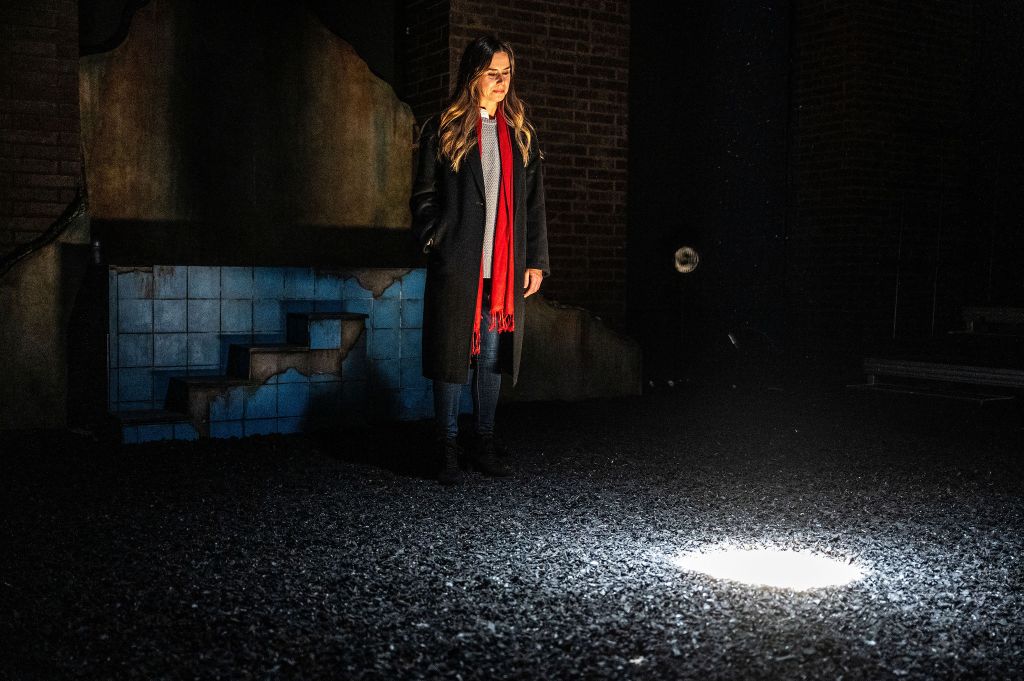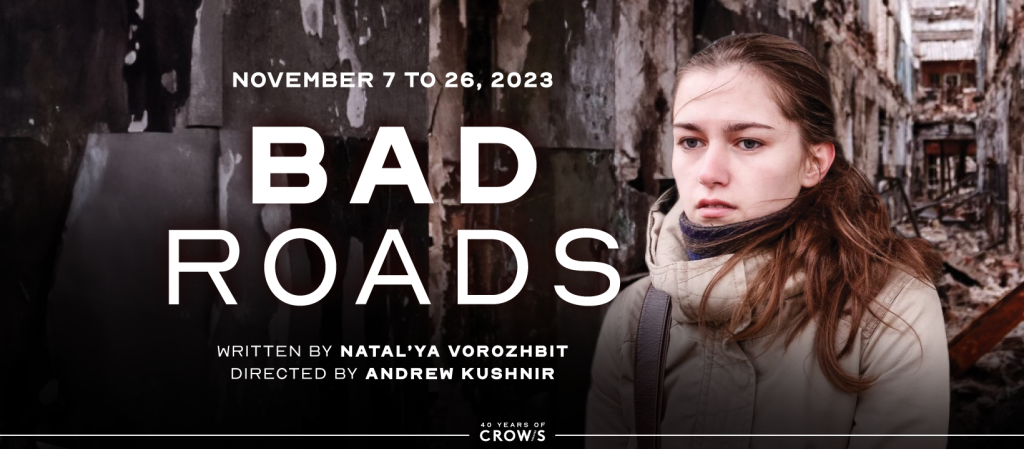The Toronto Theatre Review: Crow’s Theatre’s Bad Roads
By Ross
She tells us she will “describe everything” for us, this little sparrow, who’s taken hostage by a soldier’s eyes in the first segment of Bad Roads, a new play by Ukrainian playwright Natal’ya Vorozhbit (Royal Court’s Maidan Diaries), with a strong assist by translator Sasha Dubdale (RSC’s Oxygen), currently receiving its North American premiere at Crow’s Theatre, Toronto. The monologue, delivered strong by the captivating Michelle Monteith (Soulpepper’s Of Human Bondage), eases us in, taking us purposefully by the hand and driving us solidly through the dangerous Donbas region of Ukraine as a war rages on around them, and now us. Her voice shifts dynamically, guiding us down the many roads inside her story. The war and its destructive elements don’t keep her from noticing all that surrounds her, about the soldier who is leading her to the frontline, and about her own reactions to what exists around her, and the energy is electric, compulsive, and erotic between them. Or is it all just in her head, as a way to maintain?
The roads are bad, but the chaotic journey through all these different landscapes and experiences is one to be remembered and taken in, thanks to this dynamic complicated play and all its different elements and episodes. This is mainly because of Monteith’s ability to draw us into her mind and her meanderings. It’s a completely compelling and emotional exploration, that, as written with sharpness and intent by Vorozhbit, defies the odds of survival and creates a space for the intertwining of sex, love, loss, and resistance, all engraved inside the trauma of Russia’s invasion of Ukraine in 2014. And that’s just the first of many episodes we are about to experience.
Shining intense flashes of light into our eyes, Vorozhbit, guided by the accomplished and artful direction of Andrew Kushnir (Stratford’s Casey and Diana), wants to immerse us in, not exactly under, this soldier’s wing. They want to steer us through the intense potholes of this contextual Bad Road, aiming us into a unique opportunity to experience all that we are just hearing, seeing, and reading about in the news. To be placed inside that clear white spotlight dead center and feel the fearful nervousness and anxiety that lives in that scope. To find ourselves blinded by the flashlight shone into our eyes, or to experience the heartbreaking and emotionally challenging black-out effects of this inhumane war on the country’s social fabric. To fear the intense power dynamics of men at war, and how it damages all those women that find themselves in its presence. More specifically, to align with the people, and the women who inhabit the countryside we are being driven through. Guiding us thoughtfully and intensely into the conflictual and sometimes violent interactions between those trying to survive and those who are trying to engage.
“Bad Roads feels like more than a play – it’s a kind of portal” explains director Andrew Kushnir. “How do we, in our part of the world, connect beyond the headlines of the past 19 months? Sometimes it takes a piece of theatre to help us grasp the complexity of a place, its people, its struggle, its mysteries, and riddles. Just showing up to experience this deeply humane play is a remarkable act of solidarity.”
And we can’t help but show up for this. There’s nowhere else to look as we step into the dark black space, except inward, and feel the discomfort and intense pain that this war is raining down on this country. Through a series of powerfully dark, yet sometimes tender or funny episodes, the exceptionally talented cast of pros; Andrew Chown (Soulpepper’s Vimy) as He, Soldier 1; Katherine Gauthier (Shaw’s Shadow of a Doubt) as She, Teenage Girl; Craig Lauzon (Soulpepper’s Where the Blood Mixed) as Commander, Soldier 2; Diego Matamoros (Tarragon’s Post-Democracy) as Head Teacher, Vasya; Seana McKenna (Stratford’s Les Belles-Soeurs) as Woman 1, Vasya’s Wife; Monteith as Woman, Teenage Girl 2; and Shauna Thompson (Factory’s Vierge) as Woman 2, Teenage Girl, Girl; patiently and hypnotically drive us through the wartorn landscape of the Ukrainian people as they wait, watch, engage, combat, and drive themselves down some very dangerous but illuminating Bad Roads.
Each and every episode delivers forth the intense roughness of the terrain, thanks to some exceptional acting from its talented crew. It’s hard to single out any one of them, as each moment, so different from the previous vantage point, adds layers upon layers of tense traumatic insight. Yet, Katherine Gauthier and Andrew Chown really engage in something that will stay with me for a long time coming, constantly keeping us leaning in and anxious; curious and scared for what might happen next. Those Bad Roads might have always been there, as Thompson’s young Girl tells us before in a heartbreaking scream that rattles the air around us, but each bump along this Bad Road focuses our sight on the impact it has on those trying to survive, particularly the women trapped inside this brutal war, eating seeds and wondering, “home or shelter?“
The play is exceptionally well written, complicated, and necessarily brutal, yet sometimes funny while also being utterly disturbing and traumatizing. The episodes are unique, exacting creations, with slivers of connectivity at its heart, even if tenuous. Played out expertly by a very determined cast on a bleak horizon, courtesy of the fine work by set and properties designer, Sim Suzer (Stratford’s Love’s Labour’s Lost), the play takes us prisoner in its thematic stance, guiding us intensely through numerous constructs. It’s sharp and defined, designed to make us feel extreme yet complicated emotions so we may at least try to understand a sliver of what it must feel like to drive through those chaotic, dangerous Bad Roads. Costumed perfectly by Snezana Pesic (Soulpepper’s The Seagull), the effect is devastating, with the flashes of war lighting up the horizon, thanks to the perfectly crafted work by lighting designer Christian Horoszczak (Howland’s Three Sisters) with a super strong assist by sound designer Thomas Ryder Payne (Tarragon’s Redbone Coonhound).
Feeling all those shock waves of explosions and inhumane brutality inside every bump and turn, Bad Roads finds its clarity in the darkness of the night, and inside the brightness of a soldier’s flashlight. The only trouble here, much like the war it is unpacking, is finding a way to wrap this traumatic tale up as the play nears its two-hour mark (with no intermission). The second last scene, like a few of the others, really does its job, taking you deep inside the darkness and inhumanity of a wartorn country.
But the last one feels somehow tacked on and almost too abstract and ridiculous to expand or draw together everything else we just experienced. It doesn’t clarify or tie any theme together, at least for this viewer, but rather forces some very fine actors to act far-fetched in the idea of pre-war Ukraine. I could have easily lived without that drive-by, much less the unrealistic stance that it tries to use as a closing statement. I’m not sure what is needed at the end of this beautifully crafted saga to finish the journey, but what we are given, doesn’t do the rest of this play any justice. But disregarding that final episode, Bad Roads is exacting and purposeful, filled with almost too detailed of an approach. It’s a different species, this play, and makes you feel every heartwrenching bump on that terrible wartorn road between “here and Mordor“. A telling reference that drives the point, sharply and distinctively.






[…] (Factory’s Armadillos) with a dynamic sound designed cleverly by Thomas Ryder Payne (Crow’s Bad Roads). The distinct and sharp reverberations are amplified and muffled, shouted in and whispered out. […]
LikeLike